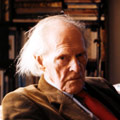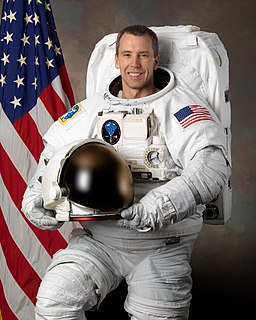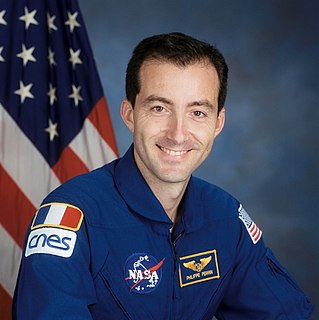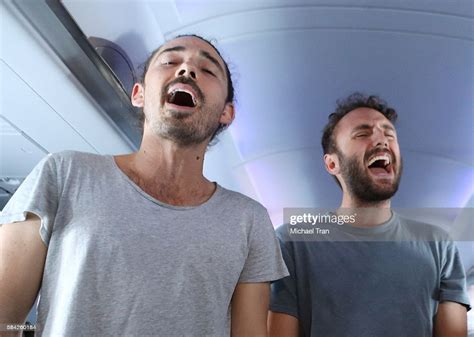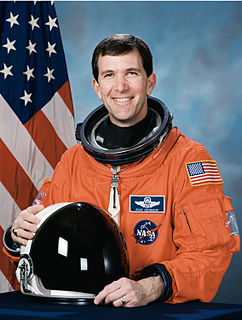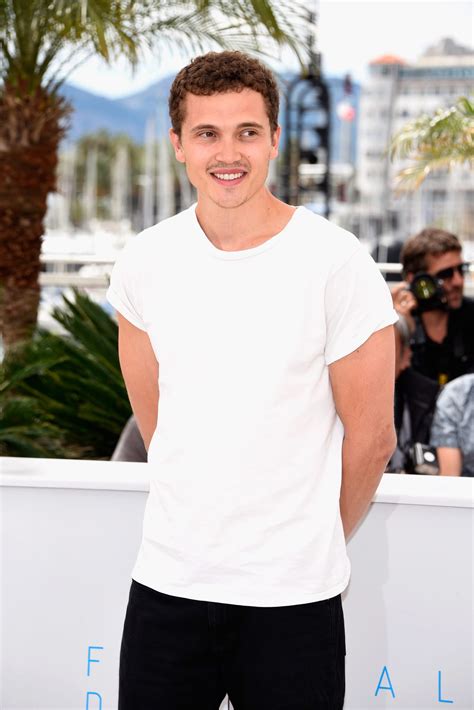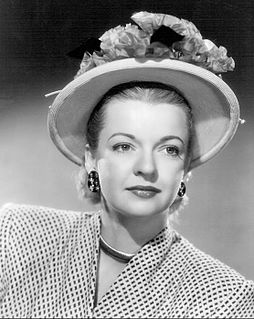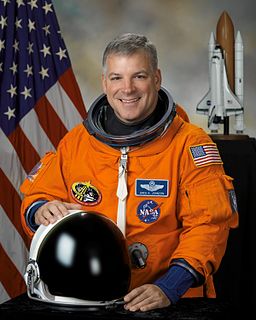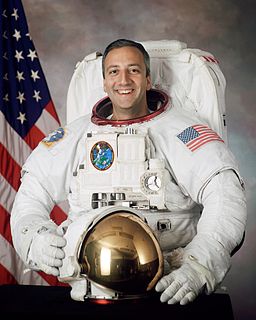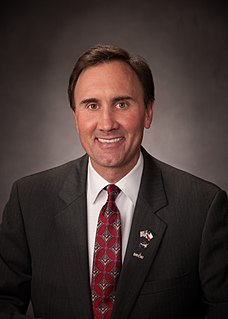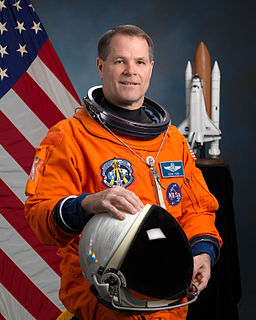Top 301 Astronaut Quotes & Sayings - Page 5
Explore popular Astronaut quotes.
Last updated on April 20, 2025.
I had looked forward
to old age as a time
of quietness, a time to draw
my horizons about me,
to watch memories ripening
in the sunlight of a walled garden.
But there is the void
over my head and the distance
within that the tireless signals
come from. And astronaut
on impossible journeys
to the far side of the self
I return with messages
I cannot decipher.
When I was younger, humans went to the moon when I was about 4 years old, and I imagined that as I got older and became an adult that traveling in space was going to be fairly common and something that we all did. So I grew up believing that I'll be an astronaut just like these guys were that were going to the moon.
I wanted to be an actor, an astrologer, an astronaut; a lot of different things were going through my mind. But I also wanted to play guitar. I mentioned to my parents that I wanted an electric guitar for Christmas. They got me one! I sat there all Christmas morning making a lot of loud horrible noise.
I saw this film Moon, it's directed by Duncan Jones, David Bowie's son. Sam Rockwell plays this astronaut that is stuck in a space station on the moon. You just have to see it. It's easy to do something really cheesy with sci-fi, and to do something that's already been done, but I think the story was something I hadn't heard before, so it was really great.
I try to be the best husband and father I possibly can. And it doesn't mean I get to spend as much time with my family as I'd like, but I do the best I can. Even if you do get to be an astronaut and get to go and do a lot of interesting things, at some point that will come to an end. If in the process you short change your family or compromise your values along the way, when you get through on the other side, it won't really be worth it. At least not to me.
I'm not making light of prayers here, but of so-called school prayer, which bears as much resemblance to real spiritual experienceas that freeze-dried astronaut food bears to a nice standing rib roast. From what I remember of praying in school, it was almost an insult to God, a rote exercise in moving your mouth while daydreaming or checking out the cutest boy in the seventh grade that was a far, far cry from soul-searching.
We have never lost a crew member on the space station, but of course, the Columbia accident. I was - I'd already been an astronaut for a decade when the crew of Columbia was killed. And I went through test pilot school. Rick Husband and I were out at Edwards at test pilot school together. He was the commander of Columbia.
So [Polaroid's Dr. Edwin] Land, at 75, went off to spend the remainder of his life doing pure science, trying to crack the code of color vision. The man is a national treasure. I don't understand why people like that can't be held up as models: This is the most incredible thing to be - not an astronaut, not a football player - but this.
The library was home away from home to my mom, and my family. We had spent every Sunday afternoon there since I was a little boy, wandering around the stacks, pulling out every book with a picture of a pirate ship, a knight, a soldier, or an astronaut. My mom used to say, "This is my church, Ethan. This is how we keep the Sabbath holy in our family.
It was hard to become an astronaut. Not anywhere near as much physical training as people imagine, but a lot of mental training, a lot of learning. You have to learn everything there is to know about the Space Shuttle and everything you are going to be doing, and everything you need to know if something goes wrong, and then once you have learned it all, you have to practice, practice, practice, practice, practice, practice, practice until everything is second nature, so it's a very, very difficult training, and it takes years.
Hillary Clinton said that her childhood dream was to be an Olympic athlete. But she was not athletic enough. She said she wanted to be an astronaut, but at the time they didn't take women. She said she wanted to go into medicine, but hospitals made her woozy. Should she be telling people this story? I mean she's basically saying she wants to be president because she can't do anything else.
The life of an actor is you do a job and it's done, then you get another job, someone tells you about one or you have to find it... it can feel a little bit like that scene in '2001' when HAL detaches the astronaut from the spaceship and he's floating off into space on this terrible trajectory into the abyss. At least, it can feel like that.
Still, I also know that most people, including me, tend to applaud the wrong things: the showy, dramatic record-setting sprint rather than the years of dogged preparation or the unwavering grace displayed during a string of losses. Applause, then, never bore much relation to the reality of my life as an astronaut, which was not all about, or even mostly about, flying around in space.
Cowgirl is a spirit, a special brand of courage. The cowgirl faces life head on, lives by her own lights, and makes no excuses. Cowgirls take stands. They speak up. They defend the things they hold dear. A cowgirl might be a rancher, or a barrel racer, or a bull rider, or an actress. But she's just as likely to be a checker at the local Winn Dixie, a full-time mother, a banker, an attorney, or an astronaut.
I had a lot of things I wanted to do... I want to be a teacher...I also want to be an astronaut...and also make my own cake shop...I want to go to the sweets bakery and say "I want one of everything", ohhhh I wish I could live life five times over...Then I'd be born in five different places, and I'd stuff myself with different food from around the world...I'd live five different lives with five different occupations...and then, for those five times...I'd fall in love with the same person.
We needed a "psychenaut" program to be the opposite of the astronaut program in order to explore the enormous domains and dimensions of inner space. We need inner space exploration. We need to have access to more capacities in order to be adequate stewards of this most incredible process of transformation in human history.
The most important thing about an astronaut is you have to take for a given a person's done pretty well in school, has the intelligence and all of that to learn new systems and new things. But after that, the most important thing I think is being able to get along with others. Flexibility and teamwork, those issues because as we fly longer and longer in space, those are really important factors, even on short shuttle missions, those are important factors, to put a crew together that can work together effectively as a team, that can get along.
I was the first person to tweet from space, but now every astronaut tweets from space and does Instagram and Snapchat and Face - they have Facebook going. I think it's more of a personal relationship they have with space now. They see it as more obtainable than me watching my superhero Neil Armstrong and Buzz Aldrin walking on the moon. It's like, there's no way I can do that.
Growing up in the shadow of Johnson Space Center and moving to Texas to welcome our last moon mission home, I wanted to be an astronaut. Combined with my love for Navy history and World War II flight ops, and unsatisfying degrees in college and law school, I joined the Navy and became a naval aviator.
At bed-time I went into my room and put out the light. I didn't get undressed. I lay on my bed and looked out of the window at the stars. I read in a book that the stars can take you anywhere. I've never wanted to be an astronaut because of the helmets. If I were up there on the moon, or by the Milky Way, I'd want to feel the stars round my head. I'd want them in my hair the way they are in paintings of the gods. I'd want my whole body to feel the space, the empty space and points of light. That's how dancers must feel, dancers and acrobats, just for a second, that freedom.
Young people today are flooded with disconnected images but lack a sympathetic instrument to analyze them as well as a historical frame of reference in which to situate them. I am reminded of an unnerving scene in Stanley Kubrick's epic film, 2001: A Space Odyssey, where an astronaut, his air hose cut by the master computer gone amok, spins helplessly off into space.
As a youngster, I read of Buck Rogers and Flash Gordon. As a student, I wrote English reports on science fiction. And as a fighter pilot, I observed the selection of the Mercury astronauts. All this was fascinating, but I really didn't think I would ever be a part of it. It was only when my good friend Ed White was selected as a Gemini astronaut that I decided to join NASA as part of the Apollo program.
I never went into physics or the astronaut corps to become a role model. But after my first flight, it became clear to me that I was one. And I began to understand the importance of that to people. Young girls need to see role models in whatever careers they may choose, just so they can picture themselves doing those jobs someday. You can't be what you can't see.
The space station mission was kind of the culmination of all of my experience of being a NASA Astronaut, so it had brought all of my previous experience into play. I had to learn the Russian language to a fluent level so that I could function as the co-pilot of the Soyuz Spacecraft that we flew up and back from the space station. And then the challenge of being the Commander of the whole expedition, a six and a-half month flight aboard the international space station. I felt the burden of the whole mission on my shoulders, which was fine, and fortunately everything did go well.
If you haven't noticed yet, working sucks. Unless you are a racecar driver or an astronaut or Beyonce, working is completely and utterly devoid of awesome. It is hard, it lasts all day, the lighting is generally fluorescent, and, apparently, drinking at your desk is frowned upon. If you ever needed to ruin someone's fun, I mean really poop a party, just move things to the workplace. Fun terminated.
Anything from making a mistake on an experiment that would ruin some scientist on earth's experiment - career, potentially - to doing something wrong with the satellite that a country was depending on for its communications, to making some mistake that could actually cost you and the crew either a mission or your lives. So there is a lot of pressure that's put on every astronaut to just make sure that he or she understands exactly what to do, exactly when to do it, and is trained and prepared to carry it out.
Why did I want to be an astronaut? That's not an easy question to answer because I know a lot of kids want to be astronauts when they grow up but it stuck with me and I think just maybe growing up in Houston and always having the astronauts and the Johnson Space Center in my backyard, I was always aware of the space program.
I was told when I grew up I could be anything I wanted: a fireman, a policeman, a doctor - even President, it seemed. And for the first time in the history of mankind, something new, called an astronaut. But like so many kids brought up on a steady diet of Westerns, I always wanted to be the avenging cowboy hero - that lone voice in the wilderness, fighting corruption and evil wherever I found it, and standing for freedom, truth and justice. And in my heart of hearts I still track the remnants of that dream wherever I go, in my endless ride into the setting sun.
From space, astronauts can see people making love as a tiny speck of light. Not light, exactly, but a glow that could be confused for light - a coital radiance that takes generations to pour like honey through the darkness to the astronaut's eyes. In about one and a half centuries - after the lovers who made the glow will have long since been laid permanently on their backs - the metropolitan cities will be seen from space. They will glow all year. Smaller cities will also be seen, but with great difficulty. Towns will be virtually impossible to spot. Individual couples invisible.
Cooperating in something as visible as space exploration and space flight can only improve relations between the two countries because what happens is, you're working on a common project in a very visible light and so, you're motivated to not have conflicts with each other in other areas. And bringing up China is a good example. In the early '90's, China got serious about wanting to launch astronauts into space and they were actually quite successful in launching many communication satellites. They went ahead and in 2003 they launched their first astronaut into space.
When I first went to Hubble, as an astronomer and as a scientist, it was a dream come true. And as an astronaut, the Hubble missions are premiere missions because Hubble is so important to science, so important to humanity, that it's just a very special event. But as an astronomer, it was sort of the holy grail of missions.
Opportunity could be defined in so many ways. There's one way of defining it, equality of opportunity, which is in fact the equality of capability, but the libertarians got there first and they have - like the Americans getting onto the moon, naming every crater after something like an astronaut - they have got there and named "opportunity" in a way that we cannot get ownership of now.
There's a huge amount of pressure on every astronaut, because when you get right down to it, the experiments that are conducted on a space flight, or the satellites that are carried up, the work that's to be done, is important and expensive work, and you are up there for a week or two on a Space Shuttle flight. The country has invested a lot of money in you and your training, and the Space Shuttle and everything that's in it, and you have to do things correctly. You can't make a mistake during that week or two that you're in space.
I attended a big human space flight conference in Beijing and I was going as myself. And really, there weren't any NASA astronauts there, I was the only so-called American Astronaut there. We had astronauts from most of the other countries, certainly from Russia, from France, from Japan, several other countries, but it was a little bit odd because here we are at an international gathering of a lot of astronauts and I'm talking about somewhere upwards of 30 or so astronauts, and I'm the only American. And I wasn't even there in an official capacity.
On the day I started college in 1979, no woman had ever been on the United States Supreme Court or served as the Speaker of the House. None had been an astronaut or the solo anchor of a network evening news broadcast. Not one had been president of an Ivy League college or run a serious campaign for president.
NEEMO missions are a challenging and exciting aspect of astronaut training. The research we conduct during those missions allows us to test new technologies and exploration concepts in conditions similar to the ones we'll experience in space. They are a great opportunity to help me expand my knowledge and develop new tools for future space exploration.
In 2006, I became the fist American to be allowed to go visit their astronaut center in China in Beijing. I think that it makes sense for the U.S. to work with China in the future and I hope to see, if the political atmosphere between the United States and China allow for us to do more cooperation together, especially in the area of human space flight. I think in the same way that it's help improve the relations between the U.S. and Russia; it would help to improve the relations between the U.S. and China.
One Chief Astronaut used to make a point of phoning the front desk at the clinic where applicants are sent for medical testing, to find out which ones treated the staff well-and which ones stood out in a bad way. The nurses and clinic staff have seen a whole lot of astronauts over the years, and they know what the wrong stuff looks like. A person with a superiority complex might unwittingly, right there in the waiting room, quash his or her chances of ever going to space.
I've fondly dreamed of becoming the face of an important brand since I was a child, in the same way that others dream of becoming an astronaut. I dreamed of this as I first and foremost dreamed of becoming an actor and would look up at these huge posters of celebrities while driving along motorways or crossing under bridges.
You need to identify the steps at which contamination can occur - those are the critical control points. You take steps to make sure that that doesn't happen. And you monitor and evaluate and test to make sure that your system is working properly. And if it's done diligently and done faithfully and monitored carefully, then they're producing safe food. And no astronaut of which I'm aware has ever gotten food poisoning in outer space.

